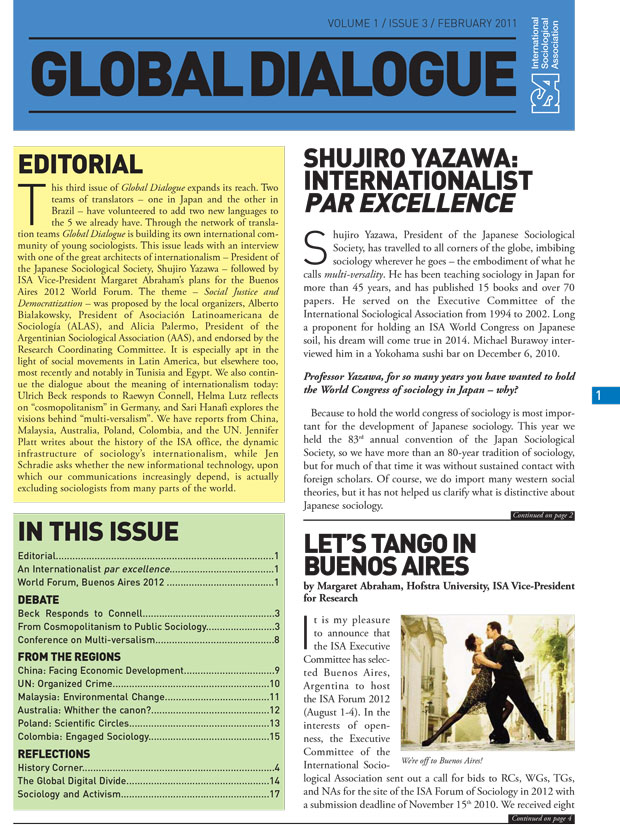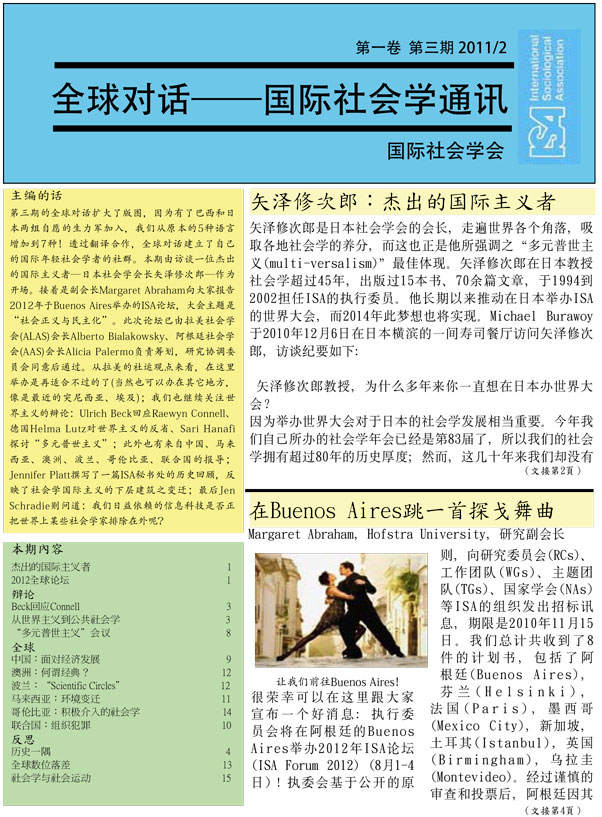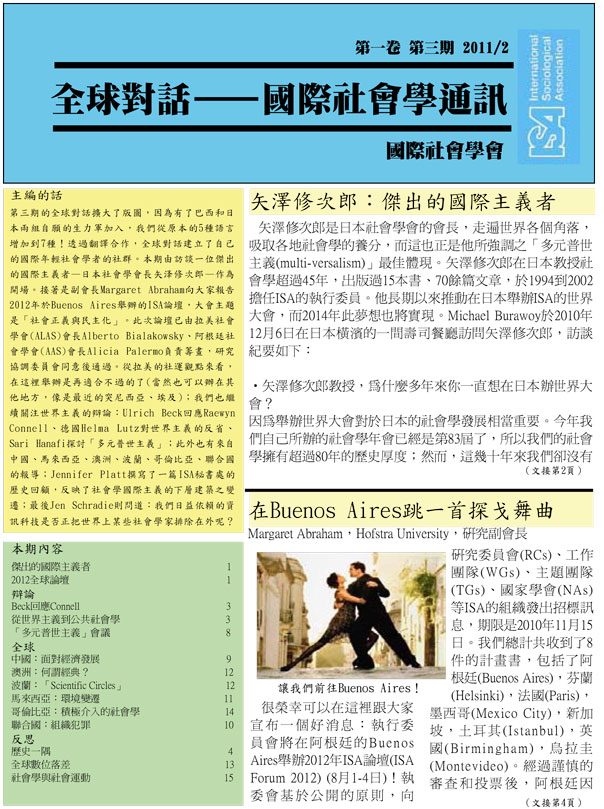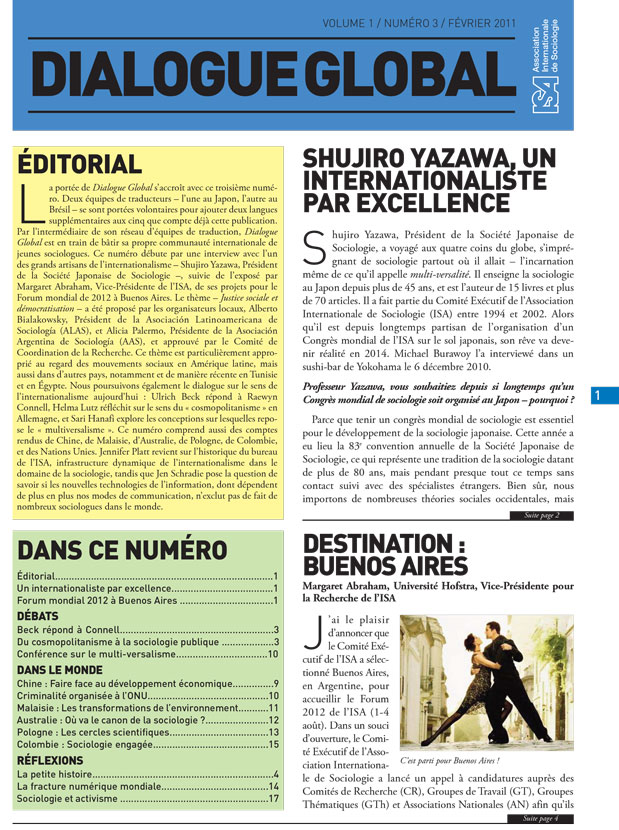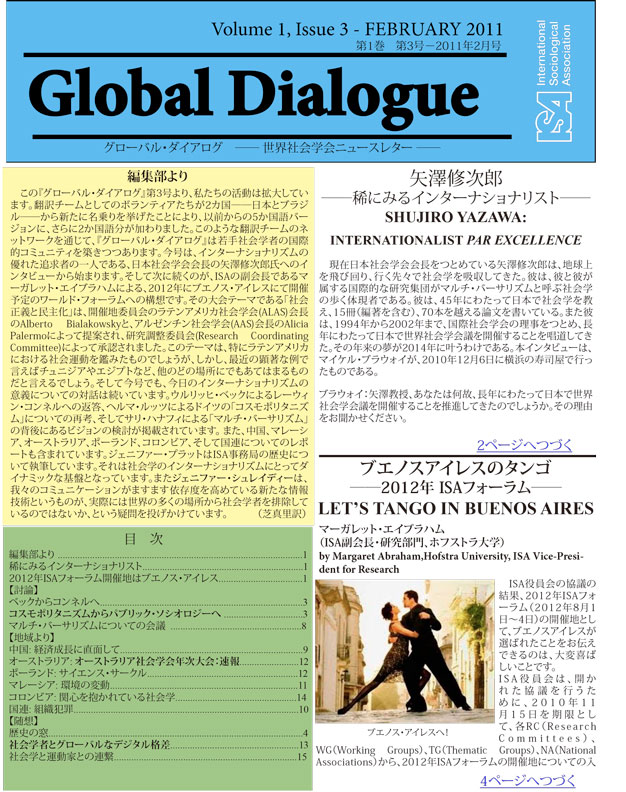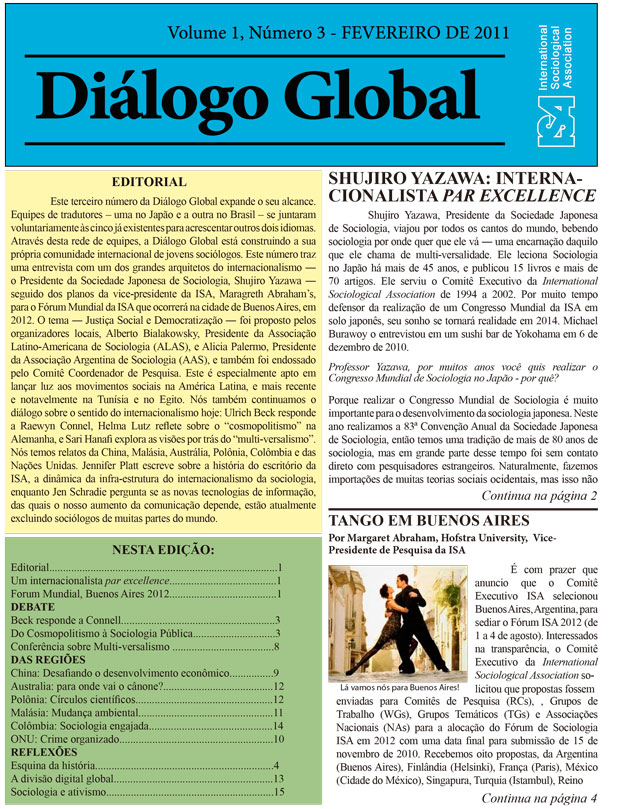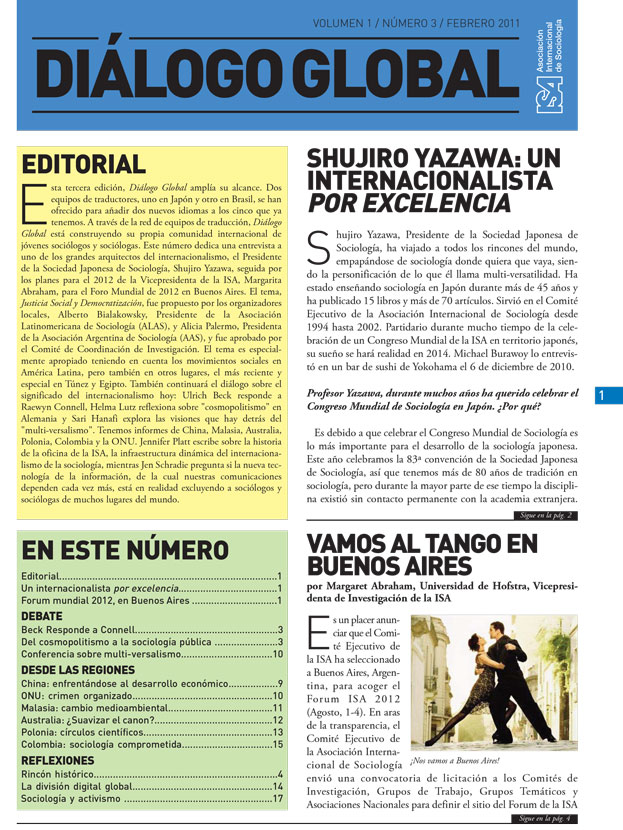Read more about Debate on Internationalism
Multi-Versalism: A New Paradigm?
by Sari Hanafi

From Cosmopolitanism to Public Sociology
by Helma Lutz
February 16, 2011
Global Dialogue, which has just been launched, is in serious danger of becoming an exercise in global monologue. My thesis was and is: We are not living in an era of cosmopolitanism but in an age of cosmopolitization. Raewyn Connell asks rhetorically: “… can we not hear the Northern narrative in these concepts?”
Let me therefore start with listing what ‘cosmopolitization’ is NOT about. It does not – as Raewyn Connell suggests – neglect the enlightening universalism of 19th century sociology. It does not reflect “the experience of a privileged minority, and treats that as the new reality of the world”; it is not a view from a highly specific somewhere, namely the European Enlightenment; it is not intended to convey the shallow political message that ‘we all are connected’, nor does it normalize imperialism and existing global power relations.
What does the notion of ‘cosmopolitization’ then have to say? And why is it so important to clearly distinguish it from the many ‘cosmopolitanisms’ (Kant, Hegel, Habermas, Nussbaum, Appiah, Benhabib, Held etc.) of European philosophy and extra-European histories of thought? ‘Cosmopolitization’ is not about ethics but about facts. There is nothing as informative as a significant example to illustrate this: fresh kidneys.
The victory of medical transplantation (and not its crisis!) has swept away its own ethical foundations and opened the floodgates to an occult shadow economy supplying the world market with ‘fresh’ organs (Nancy Scheper-Hughes). In this radically unequal world there is obviously no shortage of desperate individuals willing to sell a kidney, a portion of their liver, a lung, an eye, or even a testicle for a pittance. The fates of desperate rich patients waiting for organs have become obscurely embroiled with the fates of desperate poor people, as each group struggles to find a solution to basic problems of survival. This is what impure, really existing cosmopolitization of deprivation means: The excluded of the world, the economically and politically dispossessed – refugees, the homeless, street children, undocumented workers, prisoners, ageing prostitutes, cigarette smugglers, and petty thieves – are lured into selling their organs and this way becoming physically, morally, and economically ‘embodied’ in mortally thick bodies and in persons who are rich enough to buy and `incorporate’ the organs of their poor global others.
In the name of neo-liberal capitalism and the basic democratic right to unlimited choice, fundamental values of modernity – the sovereignty of the body, the human being and the meaning of life and death – are being sacrificed without anyone noticing this for what it is: a process that symbolizes our age of cosmopolitization.
In the cosmopolitanized body, scapes, continents, races, classes, nations and religions all become fused. Muslim kidneys purify Christian blood. White racists breathe with the aid of one or more black lungs. The blonde manager gazes out at the world through the eye of an African street urchin. A secular millionaire survives thanks to the liver carved from a Protestant prostitute living in a Brazilian favela. The bodies of the wealthy are transformed into patchwork rugs. Poor people, in contrast, have been mutilated into actually or potentially one-eyed, one-kidneyed spare-parts depots, and this has occurred ‘by their own free will’, and ‘for their own good’, as the affluent sick constantly reassure themselves. The piecemeal sale of their organs is their life insurance. At the other end of the process, the bio-political ‘citizen of the world’ emerges – a white, male body, fit or fat, with the addition of an Indian kidney or a Muslim eye, etc. In general, the circulation of living kidneys follows the established routes of capital from South to North, from poor to more affluent bodies, from black and brown bodies to white ones, and from females to males, or from poor males to more affluent ones. Women are rarely the beneficiaries of purchased organs anywhere in the world. From this it follows that the age of cosmopolitization is divided and recombined into organ-selling nations versus organ-buying ones.
The age of cosmopolitization stands for a world that for better or worse we all share, a world that has ‘no outside’, ‘no exit’, ‘no other’ anymore. We have to recognize that, regardless of how brilliantly and trenchantly we critique the ‘Northern narrative’ or ignore the ‘Southern narrative’, we are destined to live with these interwoven, contradictory framings and situations in this World at Risk (Beck, 2009), not only subject to its power of domination but also contaminated by its self-endangerment, corruption, suffering and exploitation. Abandon all dreams of autonomy that would allow anybody to remain outside! And abandon all clear cut ‘geographical racism’ between ‘Southern voices’ and ‘Northern voices’ in the social sciences!
Is this a ‘Northern narrative’? Is it a ‘Southern narrative’? No, it is both. And looking for ways to combine those contradictory perspectives systematically on the level of sociological analysis, is what ‘methodological cosmopolitanism’ is all about.
Are ‘fresh kidneys’ the exception? No, processes of cosmopolitization fundamentally affect and transform all kinds of intermediate institutions worldwide, like family, household, class, work conditions and labor market, schools, villages, cities, sciences, civil society movements, and monotheistic religions. They exist in a polycentric world where the increasingly diasporic character of the population is ensconced within the boundaries of most of its state or quasi-state units. Cosmopolitanized processes also include phenomena like climate change, global financial risks etc. Cosmopolitanized ‘global families’, for example, embody both the seeming paradox of long-distance intimacy and the contradictions of the world; and these contradictions are worked out in them. Not all families embody all contradictions, but some embody some of them. There are marriages, parents, and couples with dual-nationality and they may embody the tensions between two countries or between the majority and minority communities in those countries, while migrant families may incorporate the tensions between the centre and the periphery. Global families and long-distance intimacy can be used to rethink conventional wisdom and to prepare a powerful new narrative of “distant love” and its contradictions. It mirrors a state of ignorance that has been nationally programmed and embodied in law. It follows that distant love and global families become settings in which the cultural wounds – the rage and anger that global inequalities in their imperial history continue to generate in the souls of the living to this day – are endured and fought out.
And there is a cosmopolitization of motherhood as well. Medically assisted reproduction opens a new brave world of options (we have no words for it!): the ‘egg donor mother’ or the ‘surrogate mother’; (to put it into a formula) ‘My mother was a Spanish egg donor’ or ‘my mother was an Indian surrogate mother’. Thus by bio-scientific manipulation global inequality is being incorporated into the human body and identity.
But isn’t the narrative of cosmopolitization then just a new version of the old narrative of colonialism and imperialism? As Stuart Hall famously writes: “We have always been the sugar in the cup of tea of English men”. There is indeed a continuity and a difference which have therefore to be clarified and recognized. The notion of cosmopolitization has to overcome the ‘spatial bias’ in most of the globalization discourse and become sensitive to the histories present in the ‘cultural wounds’ of today. But it is also about the anticipation of the future in the present, about ‘reflexive modernization’, because the ‘victories’ of global capitalism, in combination with communication and medical technologies and their ‘side-effects’ undermine the institutions and basic dualisms of Northern and Southern nation-state modernity – national/international, us/them, culture/nature, centre/periphery. We may even be witnessing a radical turn in the cosmopolitization of the world. Isn’t the ex-centre being “pre-colonized” by the “ex-post-colonized”, developing regions of the world, especially by China and India? China, for example, nowadays interferes in European affairs, pledging to fight the European crisis, while also protecting its investments. In embracing Europe, China helps itself. This, too, is cosmopolitization.
So one thing is for sure: No matter, if the classics of sociology have been pioneers in ‘methodological cosmopolitanism’ or not – today ‘methodological nationalism’ blinds both “Northern” and “Southern” sociology to the epochal facts of cosmopolitization.
Why? The national gaze – one land, one passport, and one identity – is a secular version of the Holy Trinity. Thus the national attitude towards social inequality is inverted. It stops at the borders of the nation-state. Social inequalities may blossom and flourish but always on the other side of the national garden fence; that is, at best, cause for moral outrage, but it is politically irrelevant.
National boundaries draw a sharp distinction between us and them, politically relevant and irrelevant inequality. The legally institutionalized focus lies on inequalities within national societies; at the same time inequalities between national societies are faded out. The ‘legitimation’ of global inequalities is based on an institutionalized ‘looking the other way’. Living, for example, in Europe, the national gaze is ‘freed’ from looking at the misery of the world. It operates by way of a double exclusion: It excludes the excluded. And the sociology of inequality, which equates inequality with nation-state inequality, is unreflectively party to that. It is indeed astonishing, how firmly global inequalities are ‘legitimated’ on the basis of tacit agreement between nation-state government and nation-state sociology – a sociology claiming to be value-free!
Raewyn Connell argues: “The way to break out of the frame of Eurocentric thought is, surely, to study non-Eurocentric frames of thought.” I do not agree. In mapping the motley of modernities that make up today’s world, we need to define, discover and combine post-Southern and post-Northern framings. The aim is not to reaffirm the illusions of an objective ‘god’s eye perspective’ from nowhere, but to find practical answers to the everyday sociological problem, sitting somewhere in France, Australia, Japan, Mexico, India, South Africa etc.: how to research the interminglings and mixings of the cosmopolitanized world?
Is this all what cosmopolitan theory has to offer? Where is its critical bite and ambition? Isn’t impure cosmopolitization likely to feed into the ‘status quo’ to serve as a prop in global governmentality? Or does cosmopolitan theory have the staging power and wherewithal to boost its critical leverage? Can it bootstrap itself into critical self-reflexive cosmopolitanisms (plural!)? Yes, it can, but that is a different matter.
Thank you, Raewyn, for the alternative reading list!
Ulrich Beck, Ludwig-Maximilian University, Munich, Germany
This issue is not available yet in this language.
Request to be notified when the issue is available in your language.
If you prefer, you can access previous issues available in your language:

